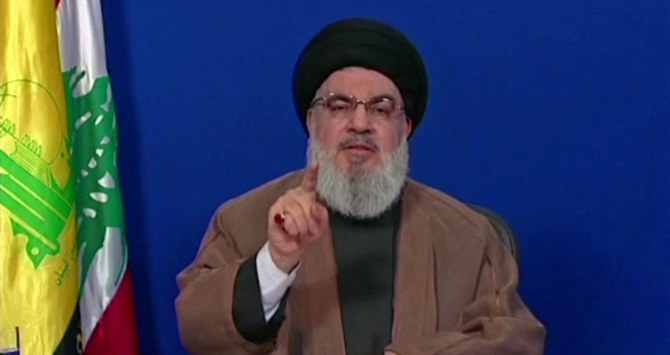BEIRUT: Hassan Nasrallah, secretary-general of Hezbollah, inflicts pain on Lebanon and its society when he associates himself with Iran’s regional strategy, says a prominent Christian bloc leader.
Samir Geagea, leader of the Christian Lebanese Forces party, told Arab News that Nasrallah “is the voice of Iran. His words have no national scope."
He said Lebanon was not currently suffering from a Christian or a sectarian-related problem, but rather from an intense national issue affecting all Lebanese people.
“Nonetheless, multiparty (politics) reflects a positive aspect,” he added.
Geagea leads one of the two major Christian blocs in the Lebanese parliament, and his party is spearheading the opposition against Hezbollah.
Gebran Bassil leads the other bloc — the Free Patriotic Movement.
Geagea said unity at a political level “cannot be achieved in the presence of two parties, the Lebanese Forces and the Free Patriotic Movement, which are not on the same page regarding the simplest issues, whether strategic matters, propositions, or even the political project and its related practices.”
He added: “Nevertheless, we are on the same page with other parties, such as the Kataeb Party and the National Liberal Party.
“The situation is not easy today, but we always have to be optimistic. The harder it is, the more we have to continue our struggle."
The Lebanese Forces party is considered Saudi Arabia’s main ally in Lebanon, and Geagea believes the relationship has deep roots.
He said: “After 2005, the March 14 Movement emerged, which included the Lebanese Forces.
“This movement had privileged relations with Saudi Arabia and the Gulf countries, enabling the Lebanese Forces to establish relations with Saudi leaders based on the convergence of interests and a shared vision for Lebanon, without forgetting the historical emotional ties between the two peoples.
“However, how can they help our country now, at a time when it is plagued by a corrupt political class, where some of its members are fiercely attacking the Gulf?”
Geagea said that Hezbollah’s speeches are only for the benefit of its supporters as it aims to justify its failures by blaming others.
He added that Iran, through Hezbollah and its allies, “unfortunately has a significant influence on politics in Lebanon.”
He said: “(The) political opposition (is) because we consider Hezbollah’s project to be disastrous for Lebanon, and the proof of this is the situation we are in today.
“(Hezbollah) is today a state within the Lebanese state that is eating away at it from within.
“We have no problem if it is an unarmed party. For Hezbollah, dialogue involves imposing their point of view.
“There have been a lot of negotiations in the past that I have personally engaged in, to no avail.
“These are mere lies and misinformation that they spread and publicize.
“Regarding the presidential elections, there is an ongoing dialogue between the parties, but Hezbollah wants a dialogue to impose its candidate, Suleiman Frangieh.
“Hezbollah does not want real dialogue; they are lying. As proof of this, the Druze leader Walid Jumblatt met with them twice without reaching any solution.
“After all, a candidate with Hezbollah’s blessing is a bad candidate for Lebanon.”
He said he believes Hezbollah’s plan “is to elect a president over the corpses of a dying people, as was the case between 2014 and 2016.”
Geagea added that Hezbollah’s strategy was to push the Lebanese people to accept its party’s candidate, whether Frangieh or someone else.
But he added: “This time we will not allow them to achieve their goal.
“According to Hassan Nasrallah’s recent press conference, Lebanon is in the eye of the regional storm. Who put it in the eye of the storm? Hezbollah and its weapons.
“The Americans helped Lebanon negotiate with Israel to demarcate the maritime borders to fully benefit from the oil and gas resources.
“US sanctions are targeting some Hezbollah leaders who are financing the party and allowing it to lead the Lebanese state."
Lebanon’s current vulnerability has led many to suggest a resurgence of Syrian influence within the country, but Geagea said the Syrian authorities “have no influence in Syria itself.”
He added: “We cannot say that Syria is regaining its former hegemony in Lebanon, while the regime is struggling to assert itself in its country and is almost isolated regionally and internationally.
“(The country) is divided into areas, with the center under Iranian control, the west under Russian control, the north under Turkish, and the east under American. Even Syrian airspace is controlled by Israel.”
Regarding the question of Christian unity in Lebanon, Geagea said: “I believe that this term is misunderstood and misused.
“While the opposition parties use it to say that Christians are divided under the framework of the presidential elections, the truth is that the obstruction is caused by the parties responsible for disrupting the open sessions held for duly electing a president, and voting in favor of a present candidate.
“I believe that the Christian community is unified under a single culture within the country. However, this statement becomes erroneous at the political level.”






























